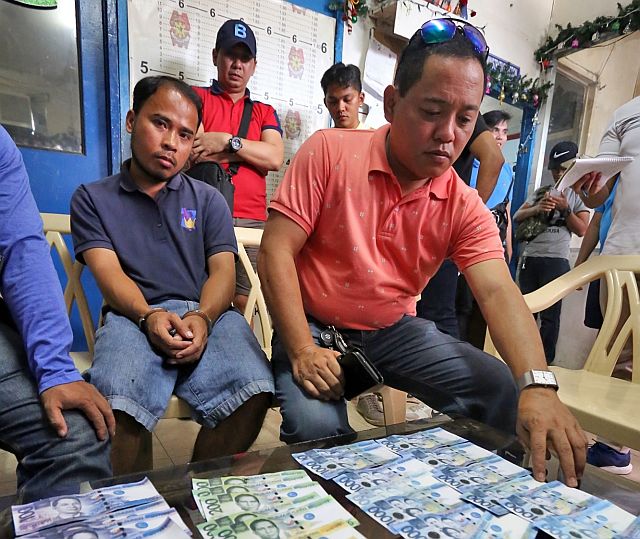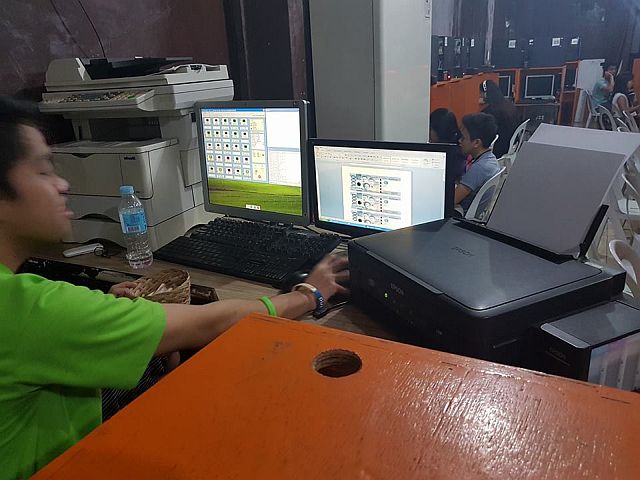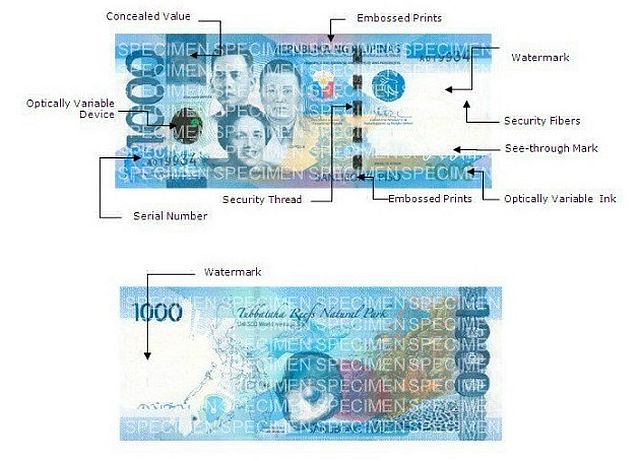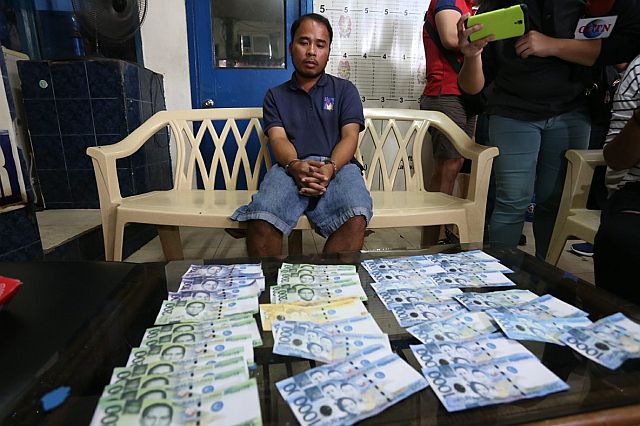
Junrey Cagay, 28, (left in handcuffs) of Barangay Quiot, Cebu City, is being questioned by Councilor Dave Tumulak (right) after the man was arrested for manufacturing fake money bills (on the table) inside an internet café in Colon Street. (CDN PHOTO/JUNJIE MENDOZA)
All it took was a computer and a printer in an internet café. Voilà! Fake peso bills were made.
Unfortunately for the fake bill maker, policemen got him and seized from him P24,000 worth of fake bills in a sting operation along Colon Street in downtown Cebu City yesterday.
The suspect, Junrey Cagay, 23, an information technology graduate and a resident of Barangay Quiot, Cebu City, was arrested after he turned over past noon yesterday pieces of fake P1,000, P200, and P100 bills to an undercover policeman who posed as a buyer. Each fake bills was sold for P20.
Cebu City Councilor Dave Tumulak said Cagay was just one of “several” persons behind the proliferation of fake money bills in Cebu.
“Based on our investigation, a syndicate has been behind the spread of fake money bills in the city. This is alarming. I urge the public to be careful,” he said in an interview.
According to Tumulak, they were now closely pursuing several leads to unmask Cagay’s cohorts.
Equally liable
Late afternoon yesterday, Tumulak and the police also raided an internet café along Sanciangko Street, Cebu City, and found digital files of fake money bills. It was at this internet café that Cagay reportedly printed the fake money bills.
Tumulak, the deputy mayor on police matters, ordered the owner of the internet café to appear before him at City Hall at 9 a.m. on Monday to explain why he should not be impleaded in the case to be filed against Cagay.
“May I request owners of internet cafés and printing press to refrain from printing counterfeit money bills. If we catch them doing it, they too will be liable because they are part of the crime,” he said.
“Let us not allow fake money to spread in Cebu City because it will ruin our economy,” he said in an interview.
Tumulak said fake money bills might also be used for vote buying during the Barangay and Sangguniang Kabataan (SK) elections in October 2017.
Charges of forgery and illegal possession of bank and treasury notes will be filed against Cagay before the Cebu City Prosecutor’s Office on Monday.
The Revised Penal Code of the Philippines prohibits “forging or falsification of treasury or bank notes (money bills).”
Anyone found guilty of violating this provision of the law shall suffer imprisonment from six to 10 years.

Authorities uncover inside one of the computers in an
internet café in Colon Street the digital files of fake bills in P1,000, P500 and P200
denominations. (Photo courtesy of Cebu City Councilor Dave Tumulak)
Last December 2016, Tumulak coordinated with Bangko Sentral ng Pilipinas (BSP) after receiving an information about the proliferation of fake money bills in Cebu City.
With the help of the police, he said they were able to track down Cagay, who, upon the request of a poseur buyer, agreed to deliver at least 39 pieces of fake P1,000, P200, and P100 bills.
Each money bill was sold by the suspect at P20.
Operatives of the Regional Intelligence Unit and the Carbon Police Station, along with officers of the Bangko Sentral ng Pilipinas (BSP), hatched an operation to arrest Cagay.
They agreed to meet in an area along Colon Street at noon yesterday.
Cagay handed over the fake money bills to the undercover policeman and in turn received the payment.
After the transaction was consummated, the policemen who were just in the area arrived and arrested Cagay.
Tumulak admitted it is difficult to determine whether or not a money bill is genuine, especially if one does not have the technical know-how.
Distinguishing features
A representative of BSP who requested anonymity said the public should take note of the distinguishing features of genuine money bills especially the embossed print which cannot be replicated.
“Feel the surface of the money bill. If it is a bit rough to the touch, that is an indicator that the money bill is genuine. If it is very smooth, then that is fake,” she explained.
The BSP representative, who only identified herself as Agent Miles, said fake money bills are made out of commercially available papers like bond papers and onion papers, while the genuine bills are made of cotton and Philippine Abaca.

SOURCE: BSP
Other security features in the banknotes or money bills include visible and embedded security fibers, a serial number with an ascending or increasing size and watermarks, she said.
When the money bills are viewed against the light, the BSP representative said the concealed value of the note and the see-through mark of the word “Pilipino” written in Baybayin, or the ancient Filipino alphabet, can be seen.
The watermark also shows the shadow image of the portrait and the money bill’s denomination on the blank space when viewed against the light from either side of the note.
When the banknote is rotated in 45 degrees and tilted downwards, a concealed denominational value can also be seen super-embossed on the smaller version of the portrait.
Five hundred–peso and P1,000 bills have the optically variable device patch, reflective foil.
For the P500 bills, the reflective coil bares the image of the small BSP logo and the blue-naped parrot, while the P1,000 bill, the reflective coil carries the image of the small BSP logo and the South Sea pearl.
“You really just have to look closer, feel and tilt the peso bill,” the BSP representative said.

Junrey Cagay, 28, was arrested by police for allegedly manufacturing fake peso bills along Colon Street in Cebu City. (CDN PHOTO/JUNJIE MENDOZA)
Lone wolf?
In an interview at the Carbon Police Station, Cagay admitted having manufactured fake money bills.
He claimed he started engaging in the illegal business only just a month ago.
“Dili naman g’yud unta ko magbuhat ana pero nag-demand man ang mga customers. (I would have wanted to stop manufacturing illegal money bills, but there was a demand from my customers),” said Cagay, who also works as a masseur.
He refused to identify his customers.
Cagay, an information technology graduate, said no one taught him how to make fake money bills.
“Ako-ako ra man sad na. Gihimo lang nako diha sa computer. (I learned the craft of making fake money by myself. I used a computer in doing it),” said Cagay who denied having cohorts in the business.
“Nagmahay lagi ko. (I regret engaging in this kind of business),” he added.
Disclaimer: The comments uploaded on this site do not necessarily represent or reflect the views of management and owner of Cebudailynews. We reserve the right to exclude comments that we deem to be inconsistent with our editorial standards.




